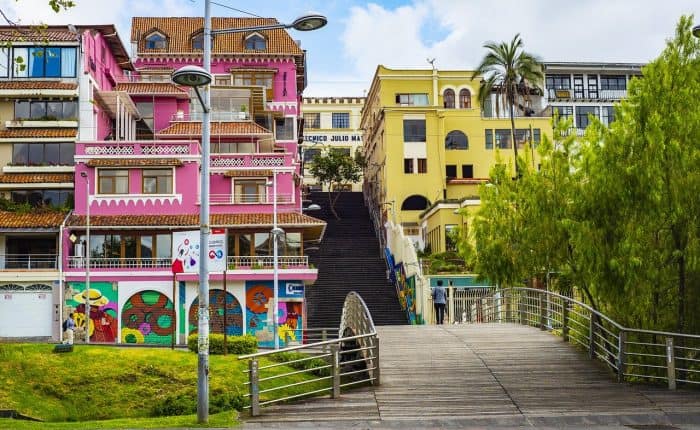Free Trade in Ecuador
Not a week goes by, sometimes it feels like nary a day, without at least one Western media news story lambasting Ecuadorian President Correa, usually utilizing words such as “leftist”, “Socialist” or “harmful to business interests”. Boots firmly planted on the ground in Ecuador for the last four (4) consecutive years and a business veteran in the country for 25 years, it is hard for me to reconcile the Western media vision, with the reality on the streets of Ecuador. Capitalism, free enterprise and business of all types is booming here and the policies of President Correa continue to advance the noble goals of not only “ free trade ”, but also a global “ fair trade ” policy.
One clear example of the rapid evolution of a pro-business climate in Ecuador, and one that should be seriously considered by anyone with a view towards business enterprise in this country, is the establishment of Special Economic Zones (SEZs) in Ecuador. They are referred to as Zonas Francas (ZFs) and Zonas Especiales de Desarollo (ZEDEs). Both designations have an end goal of promoting a better domestic manufacturing climate, aimed at improving exportation opportunities on a global scale.
The ZFs and the ZEDEs took their inspiration from the successful SEZs found in Taiwan and South Korea, the latter with which Ecuador enjoys particularly strong economic and diplomatic ties. However, the South Korea/Taiwanese model was more of a focal point for ZEDEs, while the ZFs evolved to be modeled more along the lines of similar SEZs in Central America.
While the two designations are divided less by dramatic distinctions than subtle nuance differences, the basic comparison is that ZFs focus more on the pure manufacturing sector, generally aimed at job creation and the mass production of inexpensive goods for export, while ZEDEs look at industry opportunities outside of the traditional core manufacturing sectors, such as the high-tech arena, and are intended to produce not only higher end product, but concepts, service models and innovations beyond the basic production of goods. In short, if I am looking to cost-effectively mass produce a consumer children’s toy product, I would likely look towards a ZF, while if I was looking to evolve a better technology to detect glaucoma, for early onset treatment, I would focus on a ZEDE.
The point is that both are incentive districts to promote capitalism, business incubation and the cost-effective means of production/distribution, while generating both skilled and unskilled jobs for the Ecuadorian populace. The ZEDE designation has caught particular interest, with recent success stories being highlighted in the biotech field, software development arena and innovations in the food production/processing sector. Some of the many advantages offered in the ZF and ZEDE districts are access to top quality infrastructure, low labor costs, economic assistance and a centralized geographic location, for ready market access, facilitating distribution channels.
Both the ZF and the ZEDE program are coordinated via the Ministry of Production, known in Ecuador as “el Ministerio de Coordinación de la Producción, Empleo y Competitividad”. They have clearly codified a system of laws and governing regulations to define and facilitate the application process for access to ZF and/or ZEDE districts. The Ecuadorian government has given their full commitment and placed their significant access to international resources, at the service of private enterprise wishing to avail itself of the ZF and ZEDE programs. This great effort, all in the name of advancing technological innovation, enhancing logistical services and creating a rapid impetus for the industrial diversification of the Ecuadorian economy.
While most industry sectors will be considered, the following sectors receive privileged consideration:
Bio-Technology;
Food Production and Processing;
Software Development;
Electronics;
Experience the Insider community that takes your international lifestyle to the next level. Download your FREE guide
"18 Steps to Implementing Your Plan B" instantly!
Infrastructure Development (especially ports, airports and bridges);
Regional Transportation Solutions; and
Ship and Airline Repair/Maintenance Facilities.
Some of the advantages enjoyed, beyond that already mentioned, are:
Ready Access to Ecuadorian University Training Programs, in the respective fields;
Coordinated Product Marketing Campaigns;
Facilitation with Customs Procedures;
Established LInes of Credit to Support Early Production Stages;
Exemption from a Variety of Business Fees and the 12% Sales Tax;
A 5% Reduction in the Business Tax Rate, for Locating in Targeted Priority Geographic Zones;
A 5% Reduction in the Business Tax Rate, for Meeting Targeted Job Creation Numbers;
Expedited Export Assistance to Facilitate the Distribution of ZF and ZEDE Product.
For anyone serious about starting a significant business enterprise in Ecuador, or for global companies looking to establish a new branch of operations, it pays to consider Ecuador’s enticing ZF and ZEDE programs. With access to inexpensive, but highly trained and skilled labor, many having received international training and/or education, and the strong support of the Ecuadorian Federal government, it is worthwhile to consider business operations in a country central to the dynamic current and future growth story that is South America.
Like Our Articles?
Then make sure to check out our Bookstore... we have titles packed full of premium offshore intel. Instant Download - Print off for your private library before the government demands we take these down!







